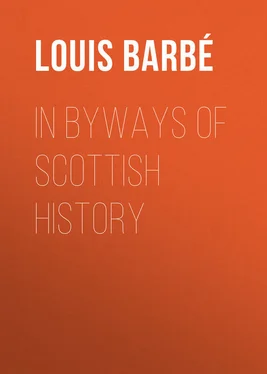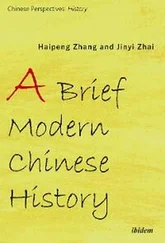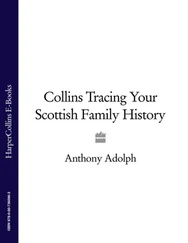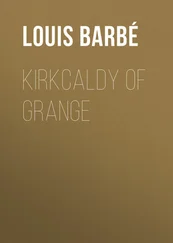Louis Barbé - In Byways of Scottish History
Здесь есть возможность читать онлайн «Louis Barbé - In Byways of Scottish History» — ознакомительный отрывок электронной книги совершенно бесплатно, а после прочтения отрывка купить полную версию. В некоторых случаях можно слушать аудио, скачать через торрент в формате fb2 и присутствует краткое содержание. Жанр: foreign_antique, foreign_prose, на английском языке. Описание произведения, (предисловие) а так же отзывы посетителей доступны на портале библиотеки ЛибКат.
- Название:In Byways of Scottish History
- Автор:
- Жанр:
- Год:неизвестен
- ISBN:нет данных
- Рейтинг книги:4 / 5. Голосов: 1
-
Избранное:Добавить в избранное
- Отзывы:
-
Ваша оценка:
- 80
- 1
- 2
- 3
- 4
- 5
In Byways of Scottish History: краткое содержание, описание и аннотация
Предлагаем к чтению аннотацию, описание, краткое содержание или предисловие (зависит от того, что написал сам автор книги «In Byways of Scottish History»). Если вы не нашли необходимую информацию о книге — напишите в комментариях, мы постараемся отыскать её.
In Byways of Scottish History — читать онлайн ознакомительный отрывок
Ниже представлен текст книги, разбитый по страницам. Система сохранения места последней прочитанной страницы, позволяет с удобством читать онлайн бесплатно книгу «In Byways of Scottish History», без необходимости каждый раз заново искать на чём Вы остановились. Поставьте закладку, и сможете в любой момент перейти на страницу, на которой закончили чтение.
Интервал:
Закладка:
The catalogue of the books 20contained in the royal library affords further information as to the nature and extent of her acquaintance with Latin literature. In it we find mention, amongst others of lesser note, of Horace, Virgil and Cicero, of Æmilius Probus and Columella, of Vegetius and Boethius. Neither did she neglect the Latinity of the Middle Ages. In prose it is represented by such forgotten names as those of Bertram of Corvey, of Ludolph of Saxony, of Joannes de Sacrobosco, and of Nicolaus de Clamangiis, the authors of ponderous treatises on science and on theology; the latter subject being one which her interest in the great ecclesiastical revolution of the age rendered particularly attractive to her. Amongst contemporary Latin poets her favourites seem to have been Petrus Bargæus, Louis Leroy, Sir Thomas Craig of Riccarton, and George Buchanan, whose dedication to her of his translation of the Psalms has not unjustly been pronounced to stand "unsurpassed by all the verses that have been lavished upon her during three hundred years by poets of almost every nation and language of Europe". 21
Whether the Queen of Scots was acquainted with Greek cannot be determined with certainty. Neither Brantôme nor Con nor Blackwood has given information on this head. If, on the one hand, her numerous Latin and French translations of Greek authors do not point to a great familiarity with it, on the other, the knowledge that she used such versions for the purpose of linguistic study, and the presence on her shelves of Homer and Herodotus, of Sophocles and Euripides, of Socrates and Plato, of Demosthenes and Lucian in the original tongue, justify the supposition that, even though she may not have rivalled the fair pupils of Ascham and of Aylmer, the productions of Athenian genius were not sealed books to her.
Amongst modern languages Spanish was that with which Mary had the slightest acquaintance, and so far as may be judged from the works which she possessed, her reading in it was limited to a book of chronicles and a collection of ballads. 22As might be expected from her early surroundings, she was more familiar with Italian. She could both speak and write it. Indeed, among the verses attributed to her there is an Italian sonnet addressed to Elizabeth. It is scarcely credible that she had not read Dante; nevertheless, it is worthy of notice that his "Divine Comedy" does not appear in the catalogue of her library 23where, however, Petrarch, Boccaccio, and Ariosto figure by the side of the less-known Bembo.
Though born in Scotland, Mary Stuart never possessed great fluency in the language of the country over which she was called to rule. Her knowledge of it was acquired chiefly, if not wholly, after her return from France. Her father, from whom she might have learnt it in childhood, she never knew. For her mother the northern Doric remained through life a foreign tongue. The attendants with whom she was surrounded in her earliest infancy were either French or had been educated in France. It is therefore questionable whether she could express herself in what was nominally her native tongue, even when she sailed from Dumbarton on her journey to the court of the Valois. That she forgot whatever she may then have known of it is beyond doubt. Seven years after she had left France she was still making efforts to learn English, using translations – amongst others an English version of the Psalms – for the purpose, but not meeting with signal success. Conversing with Nicholas White, in 1569, she began with excuses for "her ill English, declaring herself more willing than apt to learn the language". 24It was on the 1st of September of the preceding year that she wrote what she herself describes as her first letter in English. This circumstance may warrant its reproduction, though as an historical document merely, it possesses no importance. It is addressed to Sir Francis Knollys: "Mester Knollis, y heuu har sum neus from Scotland; y send zou the double off them y vreit to the quin my gud sister, and pres zou to du the lyk, conforme to that y spak zesternicht vnto zou, and sut hesti ansur y refer all to zour discretion, and wil lipne beter in zour gud delin for mi, nor y kan persuad zou, nemli in this langasg; excus my iuel vreitin for y neuuer vsed it afor, and am hestet… Excus my iuel vreitin thes furst tym." 25
The testimony of Mary's library, 26to which we have already appealed, and which is the more valuable and the more trustworthy that the books which it contained were undoubtedly collected by herself and for her own use, bears out what has been so often stated with regard to her love of French literature. In history it shows her to have been acquainted not only with the foremost chroniclers; not only with Froissart, in whose picturesque narrative her native Scotland is mentioned with such grateful remembrance of the hospitality shown him; not only with Monstrelet, from whose ungenerous treatment of the heroic Joan of Arc she may have learnt, even before her own experience taught her the hard lesson, how the animosity of party can blunt all better feeling; but also with the lesser writers, with those whose works never reached celebrity even in their own day and whose names have long ceased to interest posterity, with Aubert and Bouchet, Sauvage and Paradin.
It may be regarded as a proof of her good taste that she set but little store on the dreary romances of the time, written either in imitation or in continuation of "Amadis de Gaul", whilst to Rabelais, 27on the contrary, she accorded the place of honour which he deserved.
As regards the poets of France, all that Brantôme has told us of her partiality for them finds its justification in the almost complete collection of their works which she brought to Scotland with her. Amongst all others, however, Du Bellay, Maison-Fleur, and Ronsard were her special favourites. For the last, in particular, her enthusiasm was unbounded. It was to the verses in which he embodies the love of a whole nation that she turned for solace when the fresh sorrow of her departure from France was her heaviest burthen; it was over his pages that her tears flowed in the bitterness which knew no comfort as she sat a lonely captive in the castles of Elizabeth. As a token of her admiration she sent him from her prison a costly service of plate with the flattering inscription: "A Ronsard, l'Apollon des Français". 28
It has been asserted by Brantôme, and repeated ever since on his authority, that Mary Stuart herself excelled in French verse. The elegiac stanzas quoted by him have been admired in all good faith by succeeding generations "for the tender pathos of the sentiments and the original beauty of the metaphors". It is painful to throw discredit on the time-honoured tradition, but the late discovery of a manuscript once in Brantôme's possession has proved, beyond the possibility of a doubt, that the "Elegy on the Death of Francis II" was not composed by his wife. This was at once established by Dr. Galy of Périgueux, the possessor of the manuscript. Having since then been favoured by him with a copy of other poems contained in it and acknowledged by Brantôme as his own productions, and having compared them carefully with the "pathetic sentiments" and "original metaphors", as well as with the expressions and even the rhymes of the Elegy, we have no hesitation in going a step further, and pronouncing that the latter is from the pen of the unscrupulous Lord Abbot himself. 29Apart from this, there still remain a few poems attributed to Mary, and authenticated, not indeed by her signature, but by what is almost as authoritative, her anagrams: "Sa vertu m'atire", or "Va, tu meriteras". 30However interesting these poetical effusions may be as relics, their literary merit is of no high order, and they are assuredly not such as to deserve for the author a place amongst the poets of her century.
Читать дальшеИнтервал:
Закладка:
Похожие книги на «In Byways of Scottish History»
Представляем Вашему вниманию похожие книги на «In Byways of Scottish History» списком для выбора. Мы отобрали схожую по названию и смыслу литературу в надежде предоставить читателям больше вариантов отыскать новые, интересные, ещё непрочитанные произведения.
Обсуждение, отзывы о книге «In Byways of Scottish History» и просто собственные мнения читателей. Оставьте ваши комментарии, напишите, что Вы думаете о произведении, его смысле или главных героях. Укажите что конкретно понравилось, а что нет, и почему Вы так считаете.












